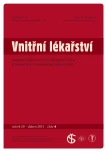-
Medical journals
- Career
Aortic stenosis
Authors: P. Gregor; H. Línková
Authors‘ workplace: III. interní – kardiologická klinika 3. lékařské fakulty UK a FN Královské Vinohrady Praha, přednosta prof. MU Dr. Petr Widimský, DrSc., FESC
Published in: Vnitř Lék 2013; 59(4): 277-283
Category: Review
Overview
This paper focuses on aortic stenosis. It covers findings related to etiopathogenesis, clinical picture, echocardiographic and catheter examination. It analyses the treatment criteria with focus on the criteria of treatment by means of cardiac surgery.
Key words:
aortic stenosis – aortic valve replacement – left ventricular pressure overload – echocardiography and aortic stenosis
Sources
1. Vahanian A, Alfieri O, Andreotti F et al. Guidelines on the management of valvular heart disesase (Version 2012). The Joint Task Force on the Management of Valvular Heart Disease of the European Society of Cardiology and the European Association for Cardio - Thoracic Surgery. Eur Heart J 2012; 33 : 2451 – 2496.
2. Linhartová K, Benešová M, Čerbák R et al. Etiologie chlopenních vad. In: Čerbák R (ed.) Nejčastější chlopenní vady: aortální stenóza a mitrální insuficience. Praha: Galén 2007, s. 188.
3. Vahanian A, Iung B, Pierard E et al. Valvular heart disease. In: Camm AJ, Lüscher TF, Serruys PW (ed.) The ESC Textbook of Cardiovascular Medicine. European Society of Cardiology, Blackwell Publishing 2009, 625 – 670.
4. Veselka J, Honěk T, Špatenka J et al. Získané chlopenní vady srdce. Praha: Medcor 2000, 59 – 84.
5. Gregor P, Widimský P et al. Kardiologie. Praha: Galén 1999, s. 595.
6. Popelová J, Benešová M, Brtko M et al. Doporučené postupy pro diagnostiku a léčbu chlopenních srdečních vad v dospělosti. Guidelines ČKS. Cor Vasa 2007; 49: K195 – K234.
7. Niederle P et al. Echokardiografie. Praha: Triton 2002, s. 359.
8. Pellika PA, Sarano ME, Nishimura RA et al. Outcome of 622 adults with asymptomatic, hemodynamically significant aortic stenosis prolonged follow‑up. Circulation 2005; 111 : 3290 – 3295.
9. Palta S, Pai AM, Gill KS et al. New insights into the progression of aortic stenosis: implications for secondary prevention. Circulation 2000; 101 : 2407 – 2502.
10. Rosenhek R, Klaar U, Schemper M et al. Mild and moderate aortic stenosis: natural history and risk stratification by echocardiography. Eur Heart J 2004; 25 : 199 – 205.
11. Otto CM Valvular Heart Diseases. Philadelphia: WB Saunders Comp 1999.
12. Bonow RO, Carabello BA, Chatterjee K et al. ACC/ AHA 2006 guidelines for the management of patients with valvular heart disease. J Am Coll Cardiol 2006; 48 : 1 – 148.
13. Conolly HM, Oh JK, Schaff HV et al. Severe aortic stenosis with low transvalvular gradient and severe left ventricular dysfunction. Result of aortic valve replacement in 52 patients. Circulation 2000; 101 : 1940 – 1946.
14. Beneš J, Gregor P, Mokráček A. Infekční endokarditida: doporučené postupy diagnostiky a léčby, dispenzarizace a profylaxe. Cor Vasa 2007; 49: K157 – K171.
15. Dominik J, Černý J. Novinky v operační léčbě chlopenních vad. In: Čerbák R (ed.) Nejčastější chlopenní vady: aortální stenóza a mitrální insuficience. Praha: Galén 2007 : 111 – 119.
16. Čerbák R. Změna indikačních kriterií k operaci. In: Čerbák R (ed.) Nejčastější chlopenní vady: aortální stenóza a mitrální insuficience. Praha: Galén, 2007 : 105 – 110.
17. Čerbák R, Bedáňová H, Bočková I et al. Plicní hypertenze u aortální stenózy. Cor Vasa 2004; 46 : 326 – 330.
18. Linhartová K, Beránek V, Šetrná F et al. Aortic stenosis severity is not a risk factor of poststenotic dilatation of the ascending aorta. Circ J 2007; 1 : 84 – 88.
19. Pibarot P, Dumesnil JG. Prosthesis - patient mismatch: definition, clinical impact, and prevention. Heart 2006; 92 : 1022 – 1029.
Labels
Diabetology Endocrinology Internal medicine
Article was published inInternal Medicine

2013 Issue 4-
All articles in this issue
- Perindopril in the treatment of hypertension and cardiovascular diseases: evolution continues with the orodispersible dosage form
- Oxidative stress in patients after kidney transplantation
- Lung metastases as the first manifestations of occult medullary microcarcinoma
- Case history acquired haemophilia A
- Use of vildagliptin from an internal disease specialist‘s point of view
- PET-CT documented fast onset of treatment response to cyclophosphamide, thalidomide and dexamethasone in patients with multicentric Castleman‘s disease. Case description and treatment information overview
- Changes in weight and diabetes compensation (HbA1c) in patients with diabetes mellitus type 2 after adding exenatide (Byetta) to the current treatment in 28 diabetology departments in the Czech Republic – BIBY‑II study (observations lasting 24 months)
- The „Short Physical Performance Battery“ in the Czech Republic – the pilot and validation study in older persons
- Which first- degree relatives of patients with colorectal neoplasias are at the highest risk
- The benefits of a remote monitoring system in long‑term follow up of patients with implantable cardioverter‑ defibrillators
- Aortic stenosis
- Tuberculosis in the Czech Republic. Current status. Diagnosis, treatment and prevention
- Internal Medicine
- Journal archive
- Current issue
- Online only
- About the journal
Most read in this issue- Aortic stenosis
- Lung metastases as the first manifestations of occult medullary microcarcinoma
- The „Short Physical Performance Battery“ in the Czech Republic – the pilot and validation study in older persons
- Perindopril in the treatment of hypertension and cardiovascular diseases: evolution continues with the orodispersible dosage form
Login#ADS_BOTTOM_SCRIPTS#Forgotten passwordEnter the email address that you registered with. We will send you instructions on how to set a new password.
- Career

